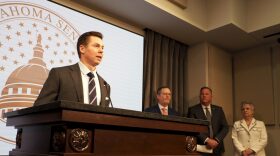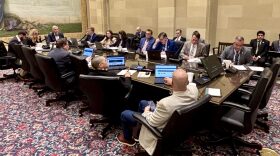It’s about 9 p.m. in Coweta, a rural town south east of Tulsa.
The election results are still trickling in as Cyndi Ralston, a second-grade teacher -turned Democratic political candidate, steps on to the stage in the small event space where she’s having her watch party.
Framed by red, white and blue balloons, Ralston tells the crowd of about 30 supporters why she decided to run for the House District 12 seat.
“I ran this year so that no teacher would have to walkout again,” she said. “I ran this year so that no family would have to lose their insurance again.”
She thanks everyone for their support and concludes her speech — and her campaign — by conceding to Republican incumbent Kevin McDugle.
Before she steps down though, she has one last comment.
“We will not let them do what they have done,” she said, promising to remain a vigilant watchdog over the legislature and make sure school funding remains a priority.
“We are watching them and we will call them out every single time,” she said.
‘A little discouraged’
Election Day was the end of an intense, seven-month political fight for Oklahoma teachers. Since the walkout in April, they worked to oust incumbents they felt did not support public schools, and to elect new government officials who they hoped would be more supportive.
Some educators even ran for office themselves: About 100 former and current teachers and administrators put their names on the primary ballot. Roughly half made it to Election Day — only 17 won Tuesday night.
The 2018 election results disappointed many.
“I just feel a little discouraged,” said Mary Short, one of Ralston’s friends and supporters who attended her watch party. “I feel really sad for my teacher friends. They probably are feeling not very supported right now. And I’m a little worried for the future of our students in Oklahoma.”
Short said it seemed like there was so much support for education issues and education candidates during the 2018 election, so she expected more teachers to win their races.
She was also pulling for Democratic gubernatorial candidate Drew Edmondson because she believed he was the stronger advocate for public schools in that race. He lost, too.
Short thinks Democratic candidates like Ralston and Edmondson didn’t win because many Oklahomans are very conservative, and won’t consider voting for anyone who’s not a Republican.
“When the teacher walkout took place, a lot of people were in support of it. But what it came down to was partisan voting, and people just straight party voting,” she said.
Two Democratic incumbent lawmakers who are former teachers also lost their bids for re-election: Representatives Karen Gaddis of Tulsa, and Donnie Condit, of McAlester.
New faces
The Oklahoma Education Association called the 2018 election results a victory for education, saying in a press release, “There are now more educators in the legislature than ever before. No matter how you look at it, public education won.”
The OEA counts 25 lawmakers in office that come from an education background, whether that be a teacher or school administrator position. Sixteen are Republicans, nine are Democrats.
Deven Carlson, an education policy researcher at the University of Oklahoma, agreed that teachers shouldn’t be discouraged about the election results.
“I think if you just look at it from the standpoint of ‘did educators win?’ it might seem like it fell a little bit flat,” he said. But if you compare the composition of the 2019 legislature to last year’s legislature he said things look “dramatically different.”
Next year’s Legislature will include more than 50 new faces, and most of the lawmakers who voted against a $450 million tax package to fund teacher pay raises are no longer in office. Many lost their re-elections, others stepped down from politics.
And Carlson said just because most new lawmakers aren’t coming to the capitol from the classroom, doesn’t mean they won’t support public schools.
“If you look at the political evolution over the past six to eight months, it’s possible to put together a much stronger case that the voters have expressed preferences about what they want out of their politicians with respect to education,” he said.
StateImpact Oklahoma is a partnership among Oklahoma’s public radio stations and relies on contributions from readers and listeners to fulfill its mission of public service to Oklahoma and beyond. Donate online.
As a community-supported news organization, KGOU relies on contributions from readers and listeners to fulfill its mission of public service to Oklahoma and beyond. Donate online, or by contacting our Membership department.






